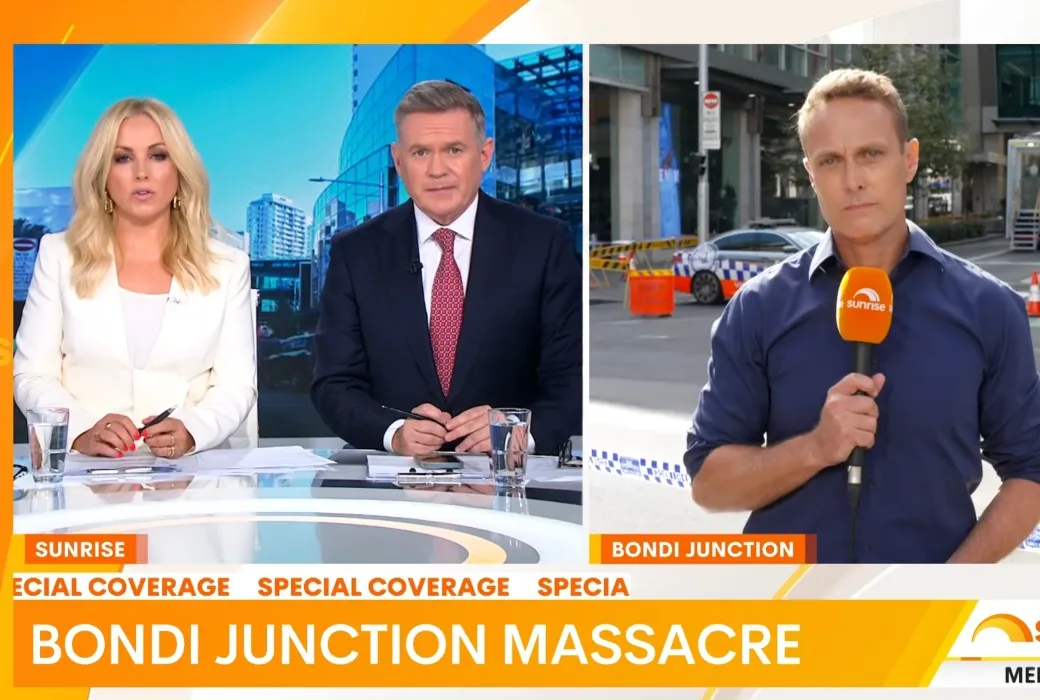Seven has apologised after mistakenly identifying the wrong man as the Bondi Junction attacker.
From around 8:30pm on Saturday, misinformation spread on social media that Benjamin Cohen, a 20-year-old UTS student, was the person who killed six people at Bondi Westfield on Saturday afternoon.
His name trended, and Seven repeated it: on its website, on YouTube – referencing the “40-year-old lone-wolf attacker Benjamin Cohen” – and on-air on Sunrise early Sunday morning, according to Nine, Guardian Australia, and The Australian. No images of Cohen were broadcast or published.
Later on Sunday, NSW Police confirmed the killer was Joel Cauchi.
Cohen told the Sydney Morning Herald: “It’s extremely disappointing to see thousands of people mindlessly propagating misinformation without even the slightest thought put to fact-checking or real-life consequences, and then using that information to push an agenda and spread hatred.
“Channel Seven has informed me that they will be issuing a formal apology.”
A Seven spokesperson said in a statement issued to Mediaweek: “The mistake was human error. It was escalated immediately and rectified. Seven sincerely apologises for the error.”
Seven’s coverage of the attack included a special bulletin last night, 7NEWS Presents: Tragedy in Bondi, which ran from 9.50pm.
Chief marketing officer Melissa Hopkins also praised an editorial from The Nightly and The West Australian editor-in-chief Anthony DeCeglie on LinkedIn yesterday, saying: “After a horrific Saturday event, I am proud to be part of a team graciously presenting the facts and keeping Aussies up to date.”
Cohen’s name was also published in the comments of the TikTok accounts for Ten, news.com.au, Nine News, and Daily Mail, and by verified accounts on X, including accounts with millions of followers. Cohen’s LinkedIn profile was shared across social media, and accompanied by antisemitic commentary, by people who claimed he looked like the attacker.
Following the Saturday attack, and before Cohen began to be falsely accused, many on X perpetuated misinformation that the attacker was motivated by Islamic faith.
Karen Percy, the president of the media division of the industry’s union, the Media, Entertainment, and Arts Alliance (MEAA), said people are “quite rightly concerned” about media coverage of the attack.
“If you want [to] call out bad journalism, there are a number of ways to do it, but via social media is not very effective. Media outlets only have to respond to official complaints,” she wrote on LinkedIn.
Percy encouraged people to file complaints with MEAA about ethical breaches by specific journalists who are members of the union, or approaching the Press Council, Free TV, or the Australian Communications and Media Authority (ACMA) after contacting the media outlet first. She pointed out that the ABC and SBS have their own complaints mechanisms on their websites, and added that it can also be “worth getting in touch with your local MP, Senators, perhaps even the Communications Minister” Michelle Rowland.
Elfy Scott, a journalist, author of The One Thing We’ve Never Spoken About, a book on her mum’s schizophrenia, and MamaMia‘s former editor, responded to the way news reporting has commented on Cauchi’s mental health: “I just want to remind journalists and readers alike that there are ethical guidelines on reporting around mental illness and violence.”
These guidelines, published by Mindframe, include not presenting a mental illness as the sole cause of violence and avoiding language that sensationalises the mental illness or defines a person by it.
“If you see anything that you feel is violating these guidelines, it’s important that you feel entitled to report it with SANE’s StigmaWatch program,” Scott said.
“This is a sensitive and painful time for the country, but it’s important to stay vigilant about media failures when it comes to stigma, considering the vast amount of harm it can cause and the ways it deters people from seeking help when they need it.”
—
See also: Westfield Bondi knife attack sees news figures spike as TV networks broadcast rolling coverage
